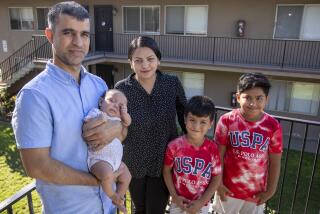Bin Laden Kin Wait and Worry
LATAKIA, Syria — Najwa Ghanem’s family is terribly worried about her safety. Not only is the mother of 11 living in the Taliban-controlled section of Afghanistan--she is married to the world’s most wanted man, Osama bin Laden.
When the war broke out, her relatives in this coastal city would have liked Bin Laden to send Ghanem and the children to safety abroad. But they stayed in Afghanistan, and since bombs began to pummel the mountainous region, she has made no contact with her family here.
“Everything that her husband is convinced of, she is convinced of,” said Laila Ghanem, 30, her younger sister by six years. “They share a conviction in a certain lifestyle, and she is convinced of this.”
The Ghanem family has a double-sided bond to Bin Laden. His wife and her siblings are also Bin Laden’s first cousins--a common phenomenon in the clannish world that exists both in Saudi Arabia and among the extended families of this part of western Syria. So although Ghanem’s brothers and sisters are worried for her, they also are supportive of their cousin, whom they spent summers with as children, riding horses, swimming in the Mediterranean and picking fruit in the orchards that blanket the countryside.
Although much attention has been focused on Bin Laden’s Saudi ties (his Yemeni father who founded a Saudi construction empire; his 53 brothers and sisters who control a multibillion-dollar fortune), Bin Laden’s maternal line has been comparatively ignored. His mother, Alia, comes from a working-class family that is largely secular. Ghanem, Bin Laden’s first wife, is the daughter of Alia’s brother. They married when she was 14 and he was about 18.
In their first interview with a Western news organization, family members here said that as Bin Laden grew from an unusually quiet, religious young man into a radical fundamentalist, his mother became increasingly worried. Whether her feelings stemmed from ideological differences with her son or fear for his safety is unclear, but family members said she tried to stop him.
“In the beginning of his path, being a mother, she was very concerned,” Laila Ghanem said. “But when she saw this was his conviction, something that he would not budge from, she said, ‘God protect him.’ ”
Six members of the Ghanem family agreed to speak about their now-infamous cousin and brother-in-law, but they were cautious and nervous and would not permit themselves to be photographed. Although they receive no benefits from having super-rich relations (they live modest, middle-class lives), they are afraid of a backlash from the powerful and secretive Saudi side of the family.
“His mother started out trying to stop him,” said Najah Ghanem, 40, another cousin. “She wanted him to come back and live in Saudi Arabia, but he didn’t.” Her brother Suleiman, 51, cut her off, saying, “Careful, you will make your cousin look bad.”
The Bin Laden connection to Latakia began in 1956, when Mohammed bin Oud bin Laden came to what was then a small seaside port surrounded by poor villages. The Ghanems said he had married a local woman before taking Alia as his fourth and final wife. Together they had only one child, the relatives said. His name was Osama.
When Alia moved to Saudi Arabia with her husband, she left behind two brothers, a sister and their growing families. Every summer, from the time Osama was 1 until this August, Alia summered in Latakia, sharing a house with her nephew Naji, 43, and his family. Naji said Osama accompanied his mother to Latakia every year until he was 17.
“We were a regular family,” Naji said, sitting in his living room beneath a photograph of the Muslim holy site of Mecca. “We would go camping, go to the beach. It was a normal life, like any other family.”
Of course, there were dramatic differences between the Latakia clan and their Saudi-born cousin. When Osama was 13, his father died in a helicopter crash and he inherited $80 million. By comparison, some members of the Ghanem family struggled to get by, growing oranges nearby in the rundown village of Jabaryoun.
Although the cousins said the young Bin Laden never flaunted his immense wealth, Suleiman Ghanem recalled one occasion when the differences in their worlds became more than obvious.
“There was a lake close by with an island in it that he really liked,” he said. “He asked if he could buy the island and live on it.”
Aside from their repeated declarations that Bin Laden was “smart” and “modest,” the cousins said they have two memories that stand out. He was very, very quiet, they said, a loner who stayed to himself and had trouble relating to other people. And he often spoke of his desire to grow up so he could take control of his father’s business empire.
In 1974, when the family said Bin Laden was about 18, he sent for his intended bride, 14-year-old Najwa. The family dispatched the young girl from her home, where women did not wear veils and were free to live secular lives, to the restrictive world of Saudi Arabia. Since then, Bin Laden has taken three more wives, which is permitted in Islam.
Ghanem had 11 children with Bin Laden. She did not return to visit her family until two years ago, when she traveled here for a month in the summer. Laila Ghanem said her sister always wore a veil and was very uncomfortable with her refusal to do so as well. She spoke little about her life in Afghanistan.
“She, being the wife of Bin Laden, should have a lot of money, but she didn’t once complain about her life,” Laila Ghanem said. “She became like him.”
When Bin Laden’s mother--who remarried after her first husband’s death--visited Latakia this summer, she again expressed concern about her son’s safety. However, the cousins said reports that Bin Laden had phoned her before Sept. 11 to cancel a planned visit to Syria were fabricated.
These days, Naji Ghanem and his family spend a lot of time sitting in their living room waiting for news from Afghanistan. They watch an old TV set that makes everything look blue. They do not believe that Bin Laden is a terrorist or that he was behind the Sept. 11 attacks.
Even if he and his family should die in the war, some of the cousins remain philosophical. “This man has chosen this path, and this is fate,” Suleiman Ghanem said. “I believe his mother’s conviction is if he dies today, he will live tomorrow in heaven.”
More to Read
Sign up for Essential California
The most important California stories and recommendations in your inbox every morning.
You may occasionally receive promotional content from the Los Angeles Times.










